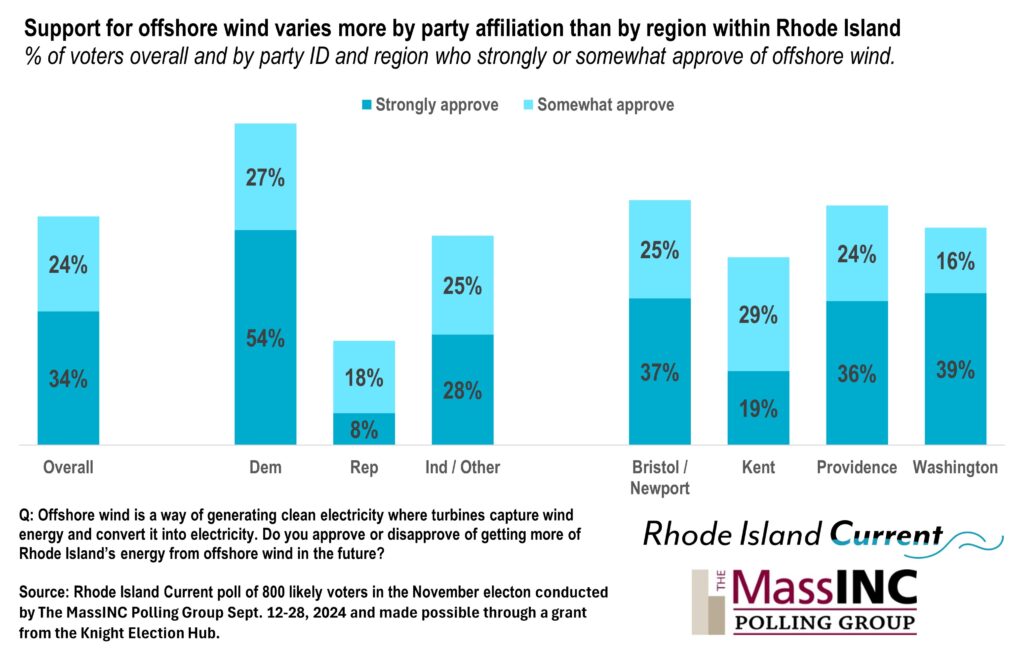Red and blue R.I. voters take different views on green energy in polling on offshore wind
October 4, 2024
Political affiliation sways Rhode Islanders opinions on offshore wind far more than how close they live to the coastline, according to a new Rhode Island Current poll.
The poll, conducted by MassINC Polling Group with funding from the Knight Election Hub, surveyed 800 likely voters from Sept. 12 to 18.
Nearly six in 10 survey participants supported plans to bring more offshore wind to Rhode Island, compared with 34% who disapproved.
The perception gap widened significantly once politics came into play. Democrats overwhelmingly backed growing the Ocean State’s offshore wind portfolio by a 68-percentage-point margin. Republicans leaned heavily in the opposite direction, with 60% expressing disapproval compared with 26% approval.
That’s not surprising to Richard Parr, senior research director for MassINC.
“Climate change and all things connected to alternative energy sources have become very polarized,” Parr said.
More than half of Democrats surveyed “strongly” approve — versus “somewhat” approving — while 43% of Republicans strongly disapprove.
“We look at the ‘strongly’ answers as a measure of intensity of feeling about an issue,” Parr said. “There’s a lot of intensity on this.”
The most passionate independent voters were evenly divided, with 28% strongly approving, and 28% strongly disapproving. When factoring in the more measured approval and disapprovals, independents favored offshore wind by a 13-percentage-point margin.
Among the 800 likely voters surveyed, 43% identified as Democrats, 27% as Republicans and 29% as independents. The survey also featured respondents of varied ages, income and education levels, races and gender.
Influence of Vineyard Wind blade failure?
The survey comes two months after a 300-foot-long blade fell off one of the Vineyard Wind turbines near Martha’s Vineyard.
Within days, pieces of neon fiberglass and styrofoam from the broken blade were found strewn along Nantucket beaches and collecting in ocean currents, fueling outrage among residents and fishermen already skeptical of the wind industry.
The cause of the blade failure remains under investigation by federal regulators, though preliminary analysis suggests a manufacturing error.
It’s hard to tell how much the Vineyard Wind debacle affected Rhode Islanders’ views on the nascent industry.
But a separate survey by Boston-based Barr Foundation completed prior to the blade incident suggests the Ocean State looked more favorably upon offshore wind earlier this summer.
Among the 400 Rhode Island voters surveyed by Barr Foundation in June, 70% wanted to bring more offshore wind electricity. The Barr poll also surveyed for opinions about a tri-state plan to buy more offshore wind power, which 67% of Rhode Islanders supported, compared with 29% who disapproved.
“It’s notable that it’s lower now,” Parr said, referring to support for offshore wind in Rhode Island Current’s poll. “It’s quite possible that the drop is attributable at least in part to the Vineyard Wind accident.”
But Parr said the wording of the questions may have influenced the results of the Barr poll, noting the appeal of a collaborative approach to survey participants.
Both polls suggest that coastal communities are not any less supportive of wind power than their inland counterparts.
Political party vs. geography
In fact, Bristol and Newport county residents, combined as one geography for the purposes of the Rhode Island Current poll, showed the strongest overall approval for offshore wind, favored by 63%. Kent County residents were the least enthused, with 48% approval and 40% disapproval.
“What you are seeing is that partisanship plays more of a role than geography,” Parr said.
Yet, where Rhode Island residents live might influence what they view as the biggest benefits, or problems, with the wind industry.
Washington County residents, who live closest to the wind-related port activity at Quonset Point, were significantly more interested in jobs and economic development than wind proponents who live in other parts of the state. Overall, the environmental benefits of wind, compared to fossil fuels, was the primary driver for wind supporters across the state.
Among offshore wind opponents, beach pollution was the top concern, named by 61% of opponents overall, and 70% of those who live in Bristol and Newport counties.
When given the option to write-in reasons why they did not want more offshore wind, opponents overwhelmingly named harms to marine life and the environment.
Specifically, references to killing of whales dominated in the 139 write-in responses of wind opponents, despite assurance from federal regulators and scientists that offshore wind turbines are not responsible for recent whale deaths.
Other write-in answers called into question the integrity of the industry and its political backers.
“Offshore wind in RI is crooked and typical RI graft and corruption,” one survey participant wrote. “The turbines off the coast of block island don’t function properly most of the time and have leaked transmission fluid, thousands of gallons that have been reported to authorities and they have buried the information.”
Another respondent summed up their concerns with “safety fires?!”
Proponents of offshore wind were less likely to add their own comments, but those that did were no less enthusiastic.
“Windmills look great!!!” one participant wrote. “I think they improve the view by 200%. A view of an offshore windmill would increase property value for me.”
GET THE MORNING HEADLINES.
Search
RECENT PRESS RELEASES
Related Post




